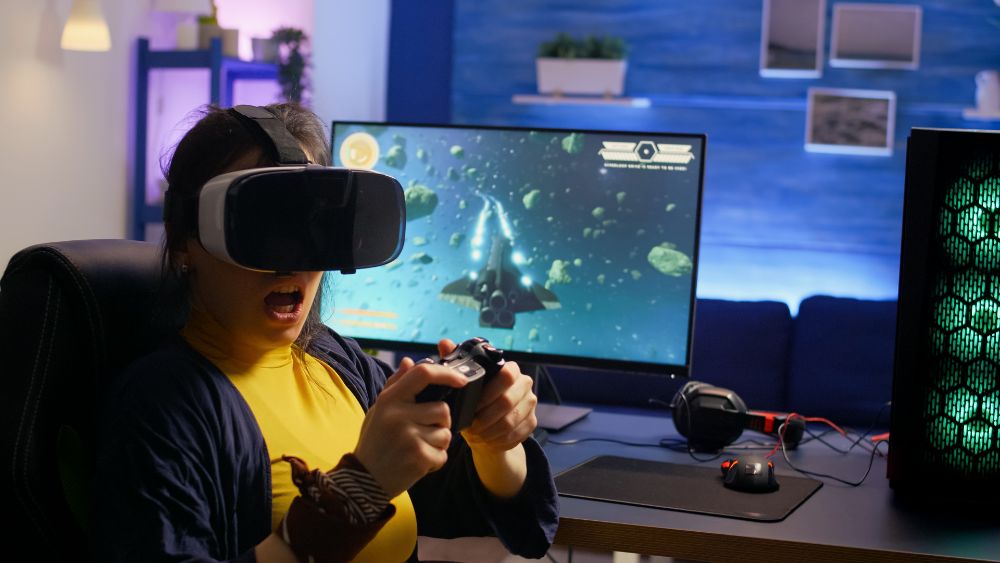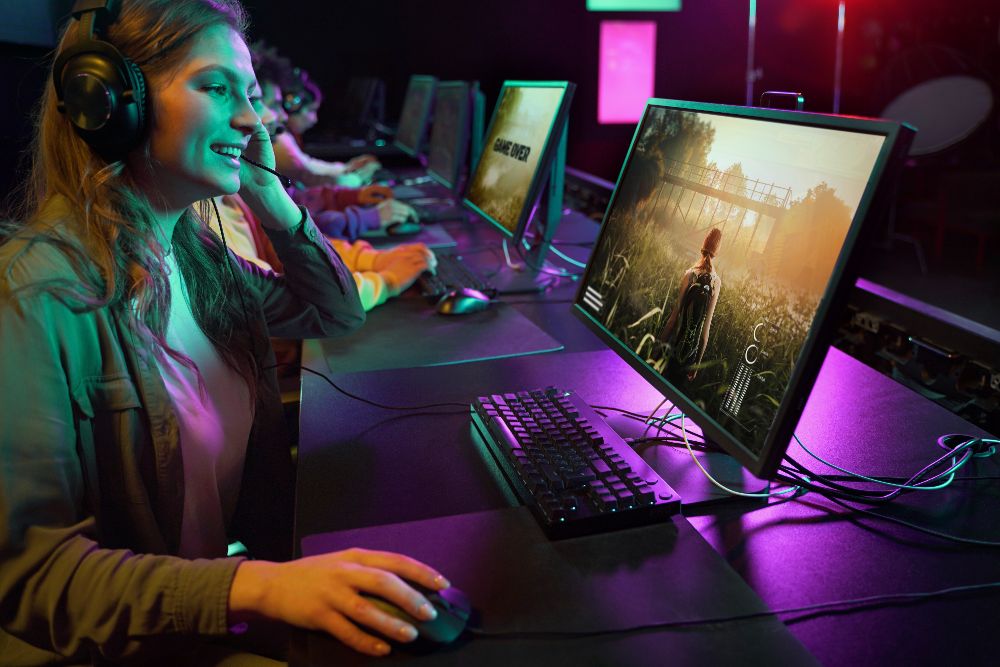The use of AI in competitive gaming has a notable impact on several aspects of the industry. AI’s role extends beyond creating more intelligent non-player characters (NPCs) to enhancing player training through adaptive strategies and personalized feedback.
For instance, AI systems can analyze player behavior to predict future actions and offer real-time improvements. However, the integration of AI is not without challenges, such as concerns about fairness and data privacy.
The implications of AI in balancing matches or detecting cheating are substantial and warrant careful consideration. These advancements have the potential to significantly alter the landscape of competitive gaming, prompting important discussions about their broader effects.
Key Takeaways
- AI-driven analytics provide real-time insights into player performance and strategies.
- Smarter NPCs adapt to player actions, enhancing game immersion and dynamic narratives.
- AI detects cheats and maintains fairness by analyzing player behavior in real-time.
- Real-time strategy adaptation allows for immediate tactical adjustments during gameplay.
- AI-powered training tools offer personalized feedback to improve player skills.
AI in Game Development
AI is making significant strides in game development, enhancing both efficiency and innovation. Game developers are increasingly observing AI’s influence across various aspects of their workflow. For instance, AI-driven procedural generation can autonomously create extensive and diverse game worlds, thereby minimizing the time developers spend on repetitive tasks. This allows developers to allocate more resources towards crafting unique gameplay experiences.
In terms of game design, AI contributes by analyzing player behavior and preferences. This analysis aids in adjusting game mechanics and balancing difficulty levels, which helps maintain player engagement and challenge. Machine learning algorithms can identify trends and suggest new features, ensuring that the game remains relevant and engaging over time.
Additionally, AI tools can streamline the testing phase of game development. Automated testing bots are capable of playing through a game and identifying bugs and glitches more quickly than manual testers. This accelerates the development process, facilitating the release of more polished games in a shorter timeframe.
AI-driven analytics provide valuable insights into player interactions with the game. Developers can use this data to make informed decisions regarding updates and expansions, which can improve player satisfaction and retention.
Smarter NPCs
Smarter NPCs (Non-Player Characters) are significantly enhancing player interactions within video games, facilitating more immersive and dynamic experiences. Unlike traditional NPCs that adhere to a predetermined script, these AI-driven characters adapt to player actions in real-time. This adaptability allows NPCs to modify their behavior based on a player’s strategies, thereby making each encounter distinct. They can learn from player actions, counter strategies, and make unexpected decisions, adding depth and realism to the game environment.
Modern NPCs no longer exhibit aimless behavior. Instead, they possess defined goals, motives, and personalities that influence their actions within the game. For instance, an NPC might remember if a player provided assistance in the past, subsequently offering better deals or additional support. Conversely, if the player wronged them, the NPC could become hostile, thereby increasing the game’s difficulty and engagement.
The implementation of smarter NPCs also enables the development of more intricate and varied storylines. By reacting differently based on player choices, these characters facilitate branching narratives with multiple potential outcomes. This ensures that each playthrough offers a unique experience, thereby maintaining player interest and encouraging repeated engagement.
Player Behavior Analysis
When you look at player behavior analysis, AI’s ability to recognize behavioral patterns becomes essential.
It provides insights into how players adapt strategies, making it easier to predict future moves. This not only enhances gameplay but also helps in developing more personalized and challenging experiences.
Behavioral Pattern Recognition
In the domain of competitive gaming, understanding player behavior is crucial for gaining a strategic edge. Behavioral pattern recognition, powered by AI, enables the analysis and prediction of opponents’ actions in real-time. By studying how players react in various scenarios, AI can identify patterns that mightn’t be evident to human observers. This allows for the anticipation of opponents’ moves, the exploitation of their weaknesses, and the refinement of one’s own strategies accordingly.
For instance, in the middle of a match, an AI system might recognize a pattern in an opponent’s playstyle. This could involve consistently adopting a defensive stance after losing a key point or rushing aggressively when the game timer is low. Having this information enables players to adjust their gameplay dynamically, potentially staying one step ahead.
AI also assists players in understanding their own habits. For example, a player might’ve a tendency to make risky moves under pressure. Being aware of these patterns allows for targeted improvement in gameplay.
Essentially, AI-powered behavioral pattern recognition converts data into actionable insights, providing a strategic advantage in competitive gaming.
Strategy Adaptation Insights
Analyzing player behavior through AI can significantly enhance competitive gaming strategies. By scrutinizing extensive gameplay data, AI can identify patterns and predict opponents’ moves, offering a tactical advantage.
Leveraging AI allows for real-time strategy adaptation. For example, if AI detects a frequently used tactic by an opponent, it can alert you, enabling an effective countermeasure. This dynamic adjustment can be crucial in high-stakes matches.
Additionally, AI provides insights into your own gameplay. It can identify your strengths and areas for improvement, pointing out predictability in your moves or missed opportunities. This feedback is essential for refining your strategy.
AI for Training Gamers
Artificial Intelligence (AI) is becoming an increasingly valuable tool in training gamers. AI-driven tools offer the capability to analyze gameplay in great detail, identifying both strengths and weaknesses. This allows for personalized feedback aimed at improving specific aspects of a player’s performance.
Unlike generic advice, AI provides tailored suggestions based on individual habits and tendencies. For instance, if a player consistently misses certain types of shots or makes specific strategic errors, the AI can pinpoint these issues and recommend targeted drills or strategies to address them. This specific, actionable feedback can significantly enhance the learning process.
Additionally, AI can simulate a variety of scenarios and opponents, offering a broad range of practice opportunities. Gamers can train against different skill levels and playstyles, better preparing them for actual competition. This is akin to having numerous sparring partners, each offering unique challenges.
Don’t miss our detailed guide about How to Become a Professional Gamer
Real-Time Strategy Adaptation
When it comes to real-time strategy games, AI can make dynamic decisions that adapt to the ever-changing battlefield.
You’ll see it predicting enemy movements and efficiently managing resources to gain an edge.
This adaptability can turn the tide of the game, making AI a formidable opponent.
Dynamic Decision Making
In the domain of competitive gaming, dynamic decision making, particularly real-time strategy adaptation, is crucial for maintaining a competitive edge. You need to make quick decisions that can alter the course of the game.
AI has become an important tool, enabling the analysis of large datasets in real time and facilitating on-the-fly strategy adjustments.
Consider a scenario where you’re engaged in a battle, and the opponent changes tactics. Without dynamic decision making, you might fall behind.
However, an AI can process incoming data about the opponent’s movements, resource allocation, and unit placements more rapidly than a human. This capability allows for immediate strategy adjustments, such as repositioning troops, reallocating resources, or executing a surprise maneuver.
Predictive Enemy Movements
Leveraging predictive enemy movements, AI can significantly improve real-time strategy adaptation by forecasting opponents’ actions based on historical data and current gameplay patterns.
In competitive gaming, this capability can create a substantial advantage by allowing players to anticipate and counteract their opponents’ strategies effectively.
By analyzing past behaviors and in-game metrics, AI can identify recurring patterns in an opponent’s strategies. This enables the prediction of their next move, providing players with a strategic advantage.
For instance, if the AI detects that an opponent frequently employs a specific unit type early in the game, it can suggest appropriate defensive measures.
This predictive functionality isn’t limited to defensive strategies; it can also enhance offensive tactics.
By understanding enemy tendencies, players can exploit identified weaknesses with precise timing. Recognizing when an opponent is likely to be vulnerable allows for more effective and well-timed attacks.
Incorporating predictive enemy movements into gameplay strategy can enhance a player’s competitive edge, making them more adept at responding to and preempting their opponents’ actions.
Resource Management Efficiency
Efficient resource management is crucial in real-time strategy games, where rapid decision-making can influence the outcome. Effective management involves gathering resources, constructing buildings, and training units more efficiently than the opponent.
Artificial Intelligence (AI) can significantly improve this process by analyzing extensive gameplay data to determine optimal strategies for resource allocation, ensuring necessary resources are available when required.
During intense gameplay, dwindling resources can pose a significant challenge. AI can adapt in real-time, automatically adjusting resource-gathering priorities based on current needs. For instance, if a resource shortage is detected, AI can redirect workers to gather additional materials, maintaining a balanced resource pool without requiring constant player intervention.
Additionally, AI can optimize build orders and production cycles, minimizing waste and enhancing efficiency. It ensures that units and structures are constructed at appropriate times, thereby maximizing strategic advantages.
Integrating AI into gameplay allows players to concentrate on high-level strategies rather than detailed micromanagement, providing a systematic edge over opponents who depend solely on manual control.
AI in Esports Tournaments
Artificial Intelligence is playing an increasingly significant role in the evolution of esports tournaments, offering advancements in both gameplay analysis and fan engagement.
AI-powered analytics provide real-time breakdowns of player statistics, strategies, and performance, allowing for a deeper understanding of the matches. This enables viewers to gain immediate insights into team tactics, strengths, and weaknesses.
In terms of logistics, AI contributes to the automation and optimization of tournament schedules, reducing delays between matches. AI algorithms efficiently manage game schedules, ensuring that events proceed smoothly and punctually, thus minimizing waiting times for spectators.
AI-driven camera systems enhance the viewing experience by capturing key moments of the game from dynamic angles and providing replays. These systems are designed to follow the action accurately, offering an immersive experience for the audience.
Additionally, AI-powered chatbots interact with fans in real-time, answering queries, providing updates, and predicting outcomes based on current game data. This interaction offers a more engaging experience, enabling fans to feel more involved in the event.
Also, check out our article https://bet-of-the-day.net/2024/10/02/how-to-organize-an-esports-tournament/
Enhancing Game Fairness
Ensuring fair play in competitive gaming is crucial, and AI technology plays a significant role in this endeavor. Encountering cheaters can be particularly frustrating in high-stakes games, and AI systems help identify and address these issues by analyzing player behavior in real-time. By detecting unusual patterns, such as unrealistically fast reaction times or consistently high accuracy, AI can flag potential cheaters promptly.
In addition to identifying cheaters, AI helps maintain fairness by detecting exploits and bugs that players might use to gain an unfair advantage. By continuously monitoring for anomalies, AI ensures that all participants adhere to the same set of rules, thereby enhancing the overall integrity of the gaming experience.
AI also contributes to more balanced matchmaking processes. By analyzing player performance data, AI-driven matchmaking systems can pair players with others of similar skill levels, which makes games more competitive and enjoyable for all participants.
Furthermore, AI aids in real-time moderation by identifying toxic behavior and inappropriate content. By addressing these issues swiftly, AI helps create a more positive and fair gaming environment.
AI-Driven Game Analytics
AI’s role in game analytics extends beyond ensuring fair play, offering significant insights that drive strategic improvements. When players engage with a game, AI tracks performance, analyzes gameplay patterns, and identifies areas for skill enhancement. This functionality operates akin to having a personal coach who continuously observes and provides data-driven suggestions for improvement.
AI-driven game analytics offer advantages not only to individual players but also to teams and developers. For teams, AI can identify strengths and weaknesses and suggest strategies tailored to counter opponents. This capability allows teams to prepare more effectively by understanding potential opponent tactics in advance.
For developers, AI provides insights into player interactions with the game, enabling data-driven decisions that refine gameplay, balance mechanics, and enhance user experience.
Additionally, AI can predict trends and outcomes by analyzing extensive datasets from numerous matches. This predictive ability assists in designing more engaging and competitive environments. Thus, players are part of an evolving system that continuously learns and adapts.
Future Trends in AI Gaming
Imagine a future where AI provides advanced player analytics, allowing you to understand your strengths and weaknesses better than ever.
Real-time strategy adaptation could revolutionize how you approach each game, keeping you one step ahead of your opponents.
Enhanced game balancing will guarantee fairer and more competitive matches, making every game feel fresh and exciting.
Advanced Player Analytics
In the domain of advanced player analytics, it’s evident that AI has the potential to significantly transform competitive gaming. By providing detailed insights into gameplay patterns, strengths, and weaknesses, AI can offer data-driven feedback aimed at skill enhancement.
AI can process extensive amounts of match data to deliver actionable insights. For instance, it can identify specific areas where a player may be underperforming, such as missing critical objectives or making suboptimal decisions under pressure. Addressing these issues through targeted training regimens can lead to more efficient improvement compared to generalized advice.
Additionally, AI analytics can benefit team performance by offering a detailed breakdown of collective dynamics. Teams can gain insights into coordination efficiency, communication gaps, and the effectiveness of various strategies. This information enables teams to make informed adjustments, thereby enhancing overall synergy.
The integration of advanced player analytics facilitates a more strategic approach to practice. With AI-driven guidance, players can focus on specific areas for improvement, making the path to becoming a competitive gamer more structured and attainable.
Real-Time Strategy Adaptation
In the evolving landscape of AI gaming, real-time strategy adaptation is emerging as a significant trend. This technology allows AI opponents to adjust their tactics dynamically, responding to player actions with a high degree of precision. Unlike traditional AI that follows pre-programmed steps, adaptive AI learns and evolves during gameplay, making interactions more complex and engaging.
AI can analyze player strategies, identify weaknesses, and exploit them in real-time. This requires players to think more critically and creatively, ensuring that each game presents a unique set of challenges.
For instance, an adaptive AI could counter a player’s current strategy and predict future moves based on observed play patterns. This level of interaction can enhance the gaming experience by making victories more satisfying and defeats more educational.
Real-time strategy adaptation can also provide a challenging opponent for experienced gamers, thereby leveling the playing field. It has the potential to redefine competitive gaming by offering new avenues for strategy development and skill enhancement.
As this technology advances, players will need to continuously refine their tactics and adapt to increasingly sophisticated AI opponents.
Enhanced Game Balancing
As AI technology advances, enhanced game balancing is likely to play a significant role in future gaming experiences. AI can analyze player data in real-time, adjusting the difficulty to maintain engagement. This approach aims to eliminate excessively easy matches and overly difficult levels, ensuring a challenge that matches the player’s skill level.
In competitive games, AI can monitor player performance and detect imbalances. It can modify game elements dynamically to keep the match balanced. This means that players are less likely to feel outmatched or bored, as AI continuously adjusts to maintain a competitive environment.
Additionally, AI can identify and correct imbalances in game mechanics that developers might overlook. By analyzing extensive gameplay data, AI can highlight specific areas that require adjustments. This can lead to smoother gameplay and a more enjoyable experience for all players.
AI also enhances player feedback mechanisms. By aggregating and analyzing feedback, AI can identify trends and common issues, helping developers make more informed decisions.
Enhanced game balancing through AI aims to provide a more responsive, fair, and enjoyable gaming experience for the entire community.
If you are interested in The Future of Esports, read this article:https://bet-of-the-day.net/2024/10/02/the-future-of-esports/
Ethical Considerations
The ethical considerations surrounding AI in competitive gaming are complex and significant. One primary concern is fairness. The use of AI to enhance player performance can create disparities among competitors. Ensuring equal access to these tools is essential to maintain fair competition.
Another important issue is transparency. When AI influences game outcomes, it’s crucial for players and fans to understand how and why. A lack of transparency can lead to mistrust within the community. Clear guidelines on AI’s role and limitations in the game are necessary to foster trust.
Additionally, the potential for AI to replace human roles raises ethical questions. While AI can make decisions rapidly and accurately, it may also displace professional players, coaches, and analysts. Balancing efficiency with the value of human talent and effort is a critical consideration.
Data privacy is another significant concern. AI systems typically rely on large datasets, raising questions about how data is collected, stored, and used. It’s important to consider who’s access to this data and to ensure robust privacy protections.
Addressing these ethical questions is essential for maintaining the integrity and spirit of competitive gaming. AI should be used to enhance the gaming experience without compromising fairness, transparency, or the value of human contributions.
Conclusion
You’ve seen how AI is revolutionizing competitive gaming, from smarter NPCs and real-time strategy adaptation to enhancing game fairness and providing personalized training. With AI-driven analytics shaping the future of gameplay, the possibilities are endless. However, don’t forget the ethical considerations around transparency and data privacy. Embrace AI’s benefits while staying mindful of these challenges, and you’ll be well-equipped for the evolving landscape of competitive gaming.



